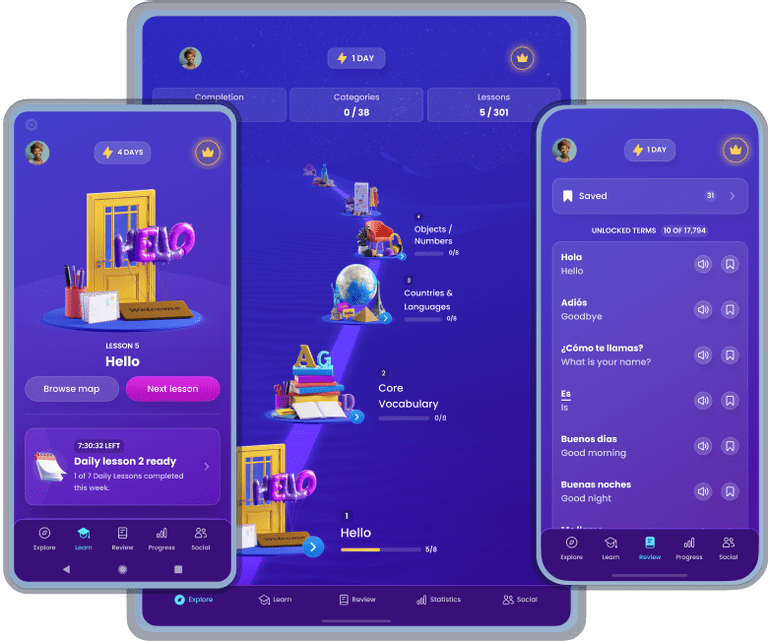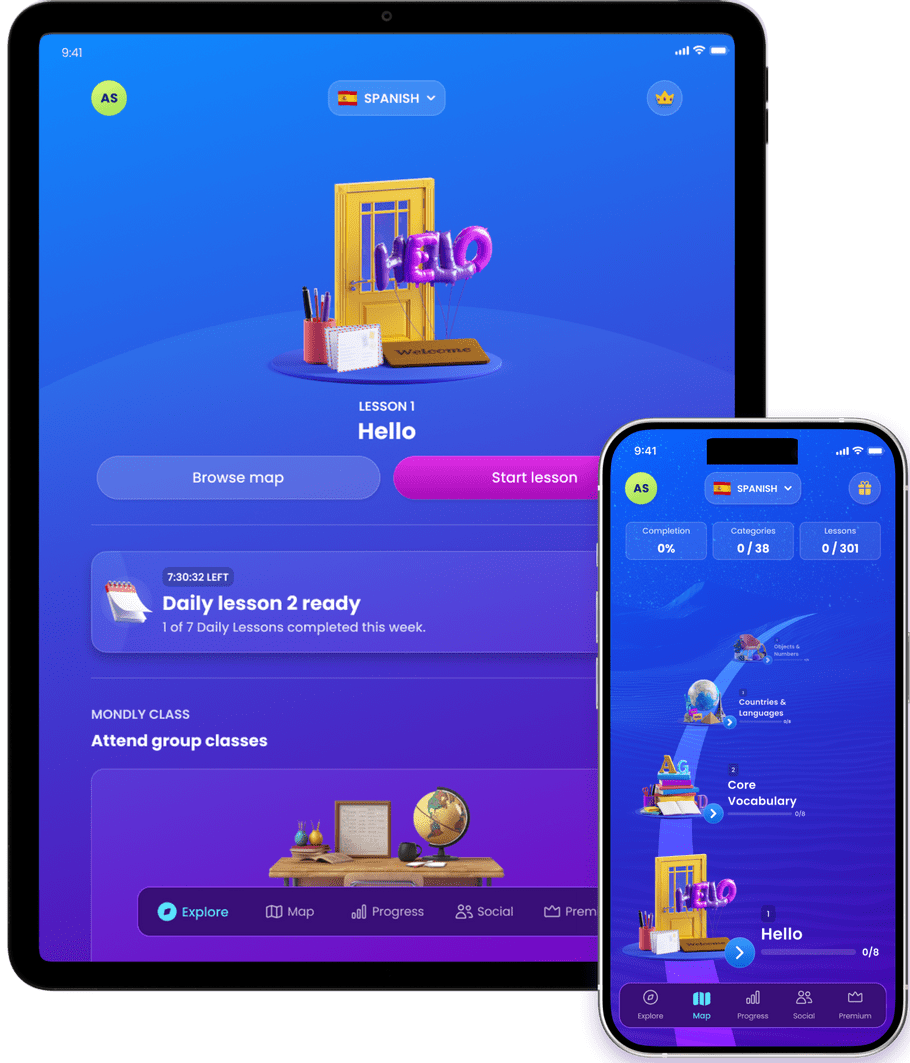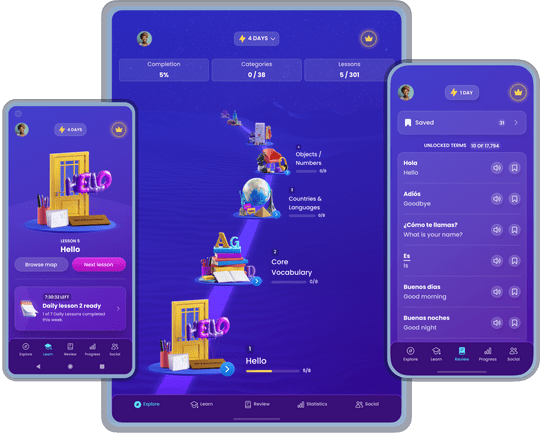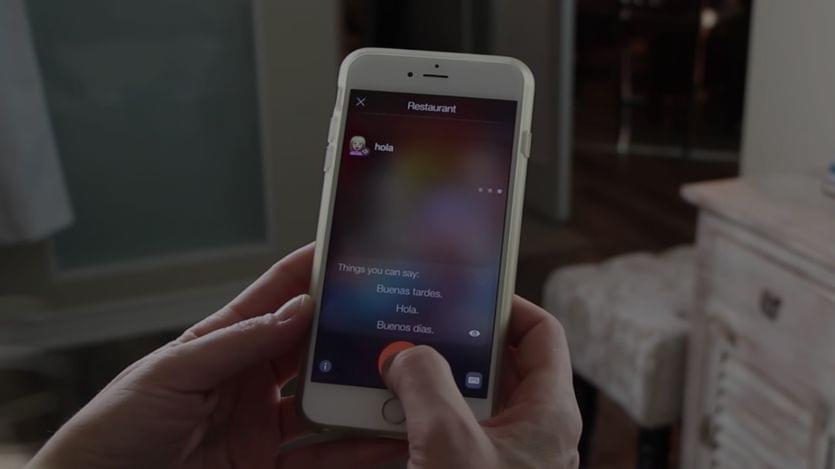How to speak Portuguese fluently in no time
Discover how to speak Portuguese fluently
Our linguists have also identified one of the major secrets of how to speak Portuguese: listening to fluent speakers in a natural setting. Because our brain is wired to absorb the information we hear, our experts made listening an essential part of learning Portuguese. As a result, during all our lessons you will hear natives speak in Portuguese clearly, correctly and in context. This way, you will pick up the natural Portuguese pronunciation of core words effortlessly.

Portuguese speaking exercises
Speak Portuguese fluently from day 1
Did you know that learning by doing is the most effective learning method? Practice Portuguese a little bit every day and you’ll speak like a native forever! Start right now with these top 10 most common Portuguese words and phrases pronounced by fluent Portuguese speakers.
1. Olá. = Hello.
First impressions matter. Don’t let anyone tell you otherwise. Learning as little as “hello” in Portuguese can work wonders in your interactions with the natives. So here’s exactly how to pronounce it:
Olá.
2. Como vai você? = How are you?
The next polite thing to do is ask “how are you?”. Sometimes, you can even skip the hello and directly ask how things are going. Here’s how to pronounce it in Portuguese:
Como vai você?
3. Qual teu nome? = What is your name?
When you travel abroad, you usually make a lot of new friends. Whether we are talking about the nice stranger on the plane, your host or the driver, here’s how to ask them what their name is:
Qual teu nome?
4. Muito prazer. = Nice to meet you.
The natives will always regard your attempt to speak their language as a sign of respect towards their culture. Another basic phrase you can use when making new friends is “nice to meet you”. Click and listen to how is it pronounced:
Muito prazer.
5. Por favor. = Please.
Manners are a must everywhere you go. And Portugal makes no exception. Saying “please” the right way and at the right time will open many doors in your path. To pronounce it in Portuguese, you simply say:
Por favor.
6. Obrigado. = Thank you.
Mothers are the best thing that ever happened to us. Not only did they raise us, but they also taught us basic manners like saying “thank you” in the proper contexts. Following their example, here’s how to say “thank you” in Portuguese:
Obrigado.
7. De nada. = You're welcome.
It doesn't matter where you are in the world. Common sense translates the same in all languages. Here's how a person from Lisbon would say “you’re welcome”:
De nada.
8. Desculpe! = Excuse me!
We only need 7 seconds to make an impression that may last a lifetime. And sometimes, the only difference between a good impression and a bad one is just a simple “excuse me”. Listen to how it's pronounced in Portuguese:
Desculpe!
9. Quanto isso custa? = How much does it cost?
Shopping sprees are an essential part of every city break. The vacation isn’t over until you buy souvenirs for each member of your family. So here’s how to ask “how much does it cost?” in Portuguese:
Quanto isso custa?
10. Adeus. = Goodbye.
If you want to maintain the good first impression you managed to make with your flawless Portuguese greetings and introductions, end the conversation by saying “goodbye” exactly like a native:
Adeus.




1 000 000+ + Ratings
Mondly was named "Editors' Choice" in Google Play and "Best New App" by Apple.
Portuguese conversations for perfect pronunciations


Learning to speak Portuguese in Virtual Reality
Meet Mondly VR, the first virtual reality application that helps you learn to speak Portuguese. Put your VR headset on and feel immersed in a world of languages. Order some chorizo in a restaurant in Porto, have an exciting Portuguese conversation on a train going to Rio de Janeiro or check into a hotel in São Paulo. It’s the closest thing to being there and that’s exactly what makes it so effective in learning Portuguese.
Remember that deer in the headlights feeling when someone asks you a question and you desperately dig through your memory trying to figure out what to say in response? In VR, you learn how to speak Portuguese by practicing the same situations in the comfort of your own home. Practice as many times as you like in a safe environment and get instant feedback until you get it right. As a result, you’ll gain the confidence to apply what you have learned in the real world. Ultimately, Mondly is all about teaching you how to speak Portuguese so you can have real-life conversations with natives. No doubt about it, Mondly VR supercharges your learning and makes learning to speak Portuguese extremely effective.


Did you know?

The Portuguese language is a soothing, romantic language similar to, Romanian, Spanish and Italian. It originated in the Iberian Peninsula after the Romans conquered it about 2000 years ago. Having an opening to the Atlantic Ocean, Portugal becomes one of the leading countries in the race to discover new lands in the 15th century. One of its first discoveries is South America where the Portuguese colonized what would soon become the largest Portuguese speaking country in the world, Brazil.
Nowadays, despite some minor differences in pronunciations and grammar, knowing Portuguese will help you get along in any Portuguese speaking country.

Speaking Portuguese has major benefits

Being able to speak with over 260 million Portuguese speakers
Portuguese is the 6th most spoken language worldwide, so you'll definitely have a lot to gain by learning conversational Portuguese. For example, you'll be able to interact with people anytime you visit Brazil or Portugal.

Traveling to Portuguese speaking countries gets way better
Wherever you plan to travel to São Paulo or Lisbon , speaking Portuguese will enhance your experience significantly. You will be able to experience Portuguese speaking countries like a native and have an authentic experience in the process.

Speaking Portuguese can save your career
Being able to speak Portuguese increases your employability significantly and makes you stand out from the crowd. This means that you will have better chances of getting a well paid job in the first place, better chances of getting promoted or getting a better job in a Portuguese speaking country.

Speaking Portuguese makes you smarter
Studies indicate that being bilingual or a polyglot increases the grey matter in your brain. This means that speaking Portuguese makes you smarter than you currently are. So, what are you waiting for?














